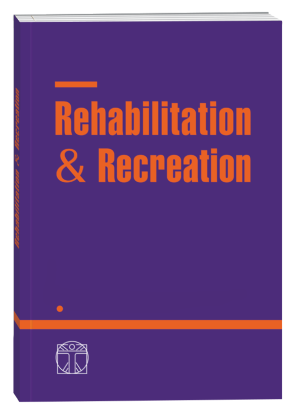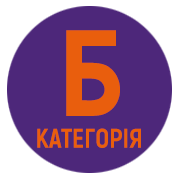COMBINATION OF PHYSICAL THERAPY AND AUTOGENIC TRAINING IN THE REHABILITATION PROCESS OF PATIENTS SUFFERING FROM RHEUMATOID ARTHRITIS
DOI:
https://doi.org/10.32782/2522-1795.2024.18.3.8Keywords:
rheumatoid arthritis, physical therapy, autogenic training, painAbstract
The aim of this study is to develop and identify the effectiveness of a combination of physical therapy (PT) and autogenic training (AT) classes for patients with rheumatoid arthritis (RA) during the outpatient stage of treatment. Material. Thirty-five women aged between 30 and 40, suffering from RA, were examined. After randomization, 18 patients were assigned to the main group (MG), and 17 patients to the comparison group (CG). The PT program lasted for 10 weeks and included educational talks, joint exercises, aerobic classes, and recommendations for self-massage, running concurrently in both groups. The difference in MG was that patients were taught the principles and process of conducting ST during the first 2 weeks. The following parameters were compared between the groups: age of patients, duration of illness, number of affected joints, activity of the inflammatory process according to the CDAI index; body mass index – BMI (kg/m²); results of the pain study according to VAS; level of fatigue according to the FAS scale; presence and level of depression according to the PHQ-9 test. Results. Prior to the PT program, there were no significant differences between MG and CG patients in terms of age, disease duration, BMI, and activity of the inflammatory process according to CDAI indicators. Additionally, there was no significant difference in the intensity of pain sensations (according to VAS), and indicators of fatigue and depression according to FAS and PHQ-9 tests. Examination of various indicators after PT showed improvements in both groups, specifically: a decrease in the severity of the inflammatory process according to the CDAI index (in MG by 3.5 points, p < 0.05; in CG by 2.7 points, p < 0.05), fatigue (according to FAS): in MG by 4.3 points, p < 0.05; in CG by 3.6 points, p < 0.05), and depression (according to PHQ-9: in MG by 2.7 points, p < 0.05; in CG by 2.3 points, p < 0.05). The sensation of pain after PT in the MG, measured using the Visual Analog Scale (VAS), decreased significantly from 5.2 to 3.8 points (p < 0.05). The decrease in pain sensation after PT in the CG from 5.1 to 4.0 did not reach a 95% probability (p > 0.05). Conclusions. PT is an important factor in the rehabilitation of patients with RA. Post-PT pain sensation (according to VAS) was lower in the MG (p < 0.05), while in the CG, the decrease did not reach a 95% probability (p > 0.05). The PT program implementation in both the MG and CG showed a probable decrease in indicators of the inflammatory process, fatigue, and depression. Therefore, the introduction of AT into the rehabilitation process together with PT may be promising for further research.
References
Григус І.М., Ногас А.О. Відновлення функціональних порушень верхніх кінцівок у пацієнтів із ревматоїдним артритом у результаті впровадження технології реабілітаційних заходів. Rehabilitation & Recreation. 2023. № 17. С. 48–60. DOI: https://doi.org/10.32782/2522-1795.2023.17.
Коритко З.І., Поник Р.М., Купріненко О.В. Вплив засобів фізичної реабілітації на якість життя хворих при ревматоїдному артриті. Науково-практичний журнал «Експериментальна та клінічна фізіологія і біохімія». 2019. Т. 4, № 88. С. 45–52.
Коритко З.І., Шуба Н.М., Борткевич О.П., Гарміш О.О. Ефективність фізичної реабілітації в пацієнтів з ревматоїдним артритом. Rehabilitation and Recreation. 2023. № 17. С. 76–83.
Кононенко Н.М., Чікіткіна В.В. Основні методи фізичної реабілітації хворих на ревматоїдний артрит. Український журнал медицини, біології та спорту. 2022. Т. 7, № 4 (38). С. 19–24.
Ногас А.О. Покращення якості життя хворих на ревматоїдний артрит за допомогою фізичної активності. Реабілітаційні та фізкультурно-рекреаційні аспекти розвитку людини. 2022. Вип. 13. С. 48–53. DOI: https://doi.org/10.32782/2522-1795.2022.13.6.
Михайловська Н.С., Стецюк І.О. Реабілітація пацієнтів із захворюваннями суглобів в практиці сімейного лікаря. Запоріжжя : ЗДМУ, 2021. 132 с.
Сікало Ю.К., Станіславчук М.А. Психоемоційні розлади у хворих на ревматоїдний артрит та їх корекція пароксетином. Український ревматологічний журнал. 2014. № 3 (57). С. 54–58.
Шкала депресії PHQ. URL: https://mozok.ua/depressiya/testy/item/2712-shkaladepres-PHQ (дата звернення: 17.09.2023).
Шкала оцінки рівня втоми: Fatigue Assessment Scale (FAS). URL: https://www.wasog.org/dynamic/media/78/documents/Questionairres/679743_FAS_Ukranian.pdf (дата звернення: 18.07.2023).
Baig S., & DiRenzo D.D. (2020). Complementary and Alternative Medicine Use in Rheumatoid Arthritis. Current rheumatology reports, 22(10), 61. https://doi.org/10.1007/s11926-020-00938-z.
Boonstra A.M., Schiphorst Preuper H.R., Reneman M., Posthumus J.B., Stewart R.E. Reliability and validity of the visual analogue scale for disability in patients with chronic musculoskeletal pain. Int J Rehabil Res, 2008. 3, 165–169
Cirlino E. Wat is a pain scale, and how it used? 2018, September. URL: https://www.healthline.com/health/pain-scale#types.
Jang S., Kwon E.J., & Lee J.J. (2022). Rheumatoid Arthritis: Pathogenic Roles of Diverse Immune Cells. International journal of molecular sciences, 2022. 23(2), 905. https://doi.org/10.3390/ijms23020905.
Jones Amaowei E.E., Anwar S., Kavanoor Sridhar K., Shabbir K., Mohammed E.H., Bahar A.R., Talpur A.S., Bhat S., Zafar S., & Qadar L.T. Correlation of Depression and Anxiety With Rheumatoid Arthritis. Cureus, 2022. 14(3), e23137. https://doi.org/10.7759/cureus.23137.
Vallerand I.A., Patten S.B., & Barnabe C. Depression and the risk of rheumatoid arthritis. Current opinion in rheumatology, 2019. 31(3), 279–284. https://doi.org/10.1097/BOR.0000000000000597.
Karokis D., Karamanis D., Xesfingi S., Antonopoulos I., Politi E., Bounas A., Lykoura C., & Voulgari P. Anxiety, Distress, and Depression in Elderly Rheumatoid Arthritis Patients. Mediterranean journal of rheumatology, 2022. 33(4), 394–406. https://doi.org/10.31138/mjr.33.4.394.
Kennedy N., Larkin L., McKenna S., Pyne T., Gallagher S., Glynn L., Fraser A., & Esbensen B. Feasibility of a physiotherapistled behaviour change intervention to improve physical activity in people with rheumatoid arthritis. Rural and remote health, 2023. 23(1), 8103. https://doi.org/10.22605/RRH8103.
Levis B., Benedetti A., Thombs B.D., & DEPRESsion Screening Data (DEPRESSD) Collaboration. Accuracy of Patient Health Questionnaire-9 (PHQ-9) for screening to detect major depression: individual participant data meta-analysis. BMJ (Clinical research ed.), 2019. 365, l1476. https://doi.org/10.1136/bmj.l1476.
Lin Y.J., Anzaghe M., & Schülke S. Update on the Pathomechanism, Diagnosis, and Treatment Options for Rheumatoid Arthritis. Cells, 2020. 9(4), 880. https://doi.org/10.3390/cells9040880.
Liu N., Yan W., Su R., Zhang L., Wang X., Li Z., Qin, D., & Peng, J. Research progress on rheumatoid arthritis-associated depression. Frontiers in behavioral neuroscience, 2023. 16, 992223. https://doi.org/10.3389/fnbeh.2022.992223.
Modarresi Chahardehi A., Masoumi S.A., Bigdeloo M., Arsad H., & Lim V. The effect of exercise on patients with rheumatoid arthritis on the modulation of inflammation. Clinical and experimental rheumatology, 2022. 40(7), 1420–1431. https://doi.org/10.55563/clinexprheumatol/fohyoy.
Nagy Z., Szigedi E., Takács S., & Császár-Nagy N. The Effectiveness of Psychological Interventions for Rheumatoid Arthritis (RA): A Systematic Review and Meta-Analysis. Life (Basel, Switzerland), 2023. 13(3), 849. https://doi.org/10.3390/life13030849.
Pope J.E. Management of Fatigue in Rheumatoid Arthritis. RMD open, 2020. 6(1), e001084. https://doi.org/10.1136/rmdopen-2019-001084.
Ramirez Garcia M.P., Leclerc-Loiselle J., Côté J., Brouillette M.J., & Thomas R. Effect of autogenic training on quality of life and symptoms in people living with HIV: A mixed method randomized controlled trial. Complementary therapies in clinical practice, 2023. 50, 101716. https://doi.org/10.1016/j.ctcp.2022.101716.
Seymour B. Pain: A Precision Signal for Reinforcement Learning and Control. Neuron, 2019. 101(6), 1029–1041. https://doi.org/10.1016/j.neuron.2019.01.055.
Downloads
Published
How to Cite
Issue
Section
License
Copyright (c) 2024 О. О. Древіцька, В. І. Бульда, Н. І. Хомченкова

This work is licensed under a Creative Commons Attribution-NonCommercial-NoDerivatives 4.0 International License.











